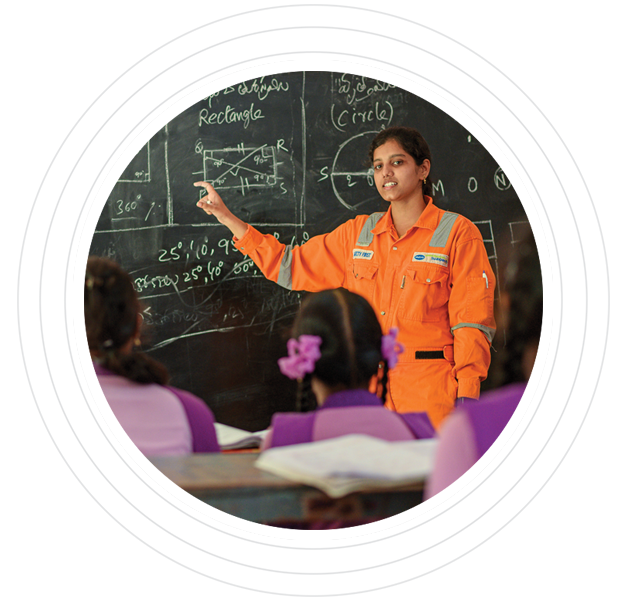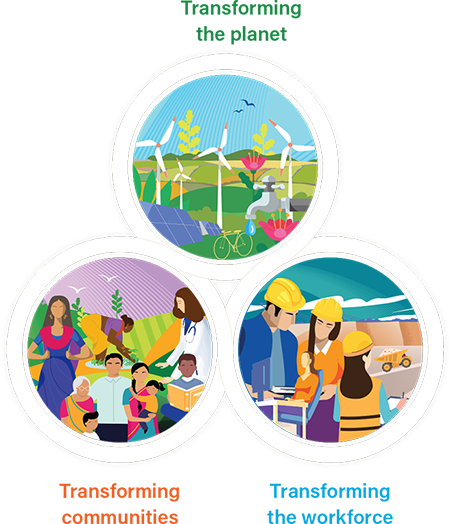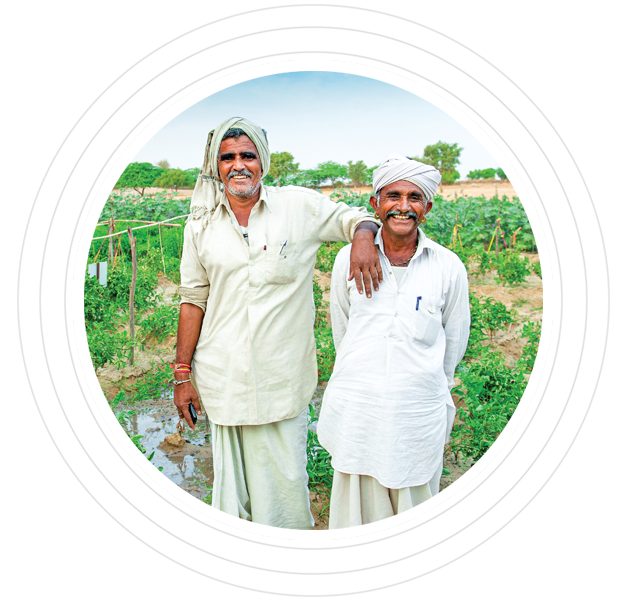Sustainability strategy
Vedanta intends to become an ESG leader in the natural resources sector. Our ESG strategy intertwines with our business growth plans. As the world transitions towards a low-carbon economy, the demand of metals and minerals is expected to grow significantly. Vedanta produces nine out of the 17 metals & minerals that will lay the foundation for green technologies such as Electric Vehicles, solar, and wind power generation, and battery storage. It is in this context that our refreshed vision takes on new meaning. Our goal is to produce these metals responsibly.

BUSINESS WITH A PURPOSE
In FY2022, we refreshed our vision to reflect the ambition that we wanted to aspire towards. Our vision of ‘Transforming for Good’ has been developed through extensive consultations with internal teams and external stakeholders and is designed to convey our intention to embed ESG-management principles in the way we do business.
A new three pillar sustainability-focused vision has enabled us to embark on an exciting journey with commitments and promises that we need to fulfil to our communities, the planet and workforce. These pillars are:
There are 9 aims under these pillars that speak to our commitment to minimise harm, in alignment with the Company’s philosophy of achieving “Zero Harm, Zero Waste, Zero Discharge”. Our ESG strategy allows the business to respond to expectations from our key stakeholders around climate change, human rights, safe work conditions, environmental stewardship, diversity & inclusion and good governance. It builds upon the strong foundation of world-class policies and standards that the ompany has built over the last decade.

Sustainability journey
FY2014
Businesses started embedding Vedanta Sustainability Framework – training and implementation of policies and standards
External review concluded (URS - Scott Wilson) – all recommendations got successfully closed
Sustainability linked with remuneration – sustainable development KPIs linked to executive remuneration
Vedanta Sustainability Assurance Programme (VSAP) – into its second year of implementation, supported by external auditors
FY2015
Roll out of Vedanta Sustainability Framework continues – introduction of safety performance standards, formal safety risk assessment, industrial hygiene baseline assessment and safety leadership coaching
VSAP into its third year of implementation – revised as per the material priorities, supported by external auditors
Environment and social review of VSAP - started external review
Revisiting our Community Need Assessment Studies – aligning all community projects with updated studies
FY2016
Environment and social review of VSAP – continued external review
VSAP into its fourth year of implementation – revised as per the material priorities with more emphasis and focus on safety by inclusion of safety performance standards, supported by external auditors
Advancing safety – by developing safety performance standards and incorporating executive remuneration
Social Impact Assessment Studies – HZL and Cairn India aligning all community projects with updated studies
FY2017
VSAP into its fifth year of implementation
VSAP material priorities identified for FY2017 – occupational health and safety, resource use and management, stakeholder engagement, and supplier and contract management
Social Impact Assessment Studies – completed for nearly all our businesses; major social impact assessment studies done at Cairn Oil and Gas Business
Advancing accountability – employee health, safety and well-being identified as a material issue, a key priority for the Company
FY2018
Strong focus on safety
Alignment across businesses on a collective carbon strategy
Launching a systematic, Group- wide programme – to monitor and maintain tailings dams in line with global best practices
Consolidating efforts to drive effective implementation of the provisions of the Modern Slavery Act across our businesses
Re-evaluating our social performance standards in order to enhance our social licence to operate
FY2019
Strategy to increase leadership engagement on workplace safety
Work begun on upgrading tailings dam facilities and management practices
Work begun to improve social licence to operate – perception surveys, materiality assessment, social performance review, FPIC requirements review
FY2020
Pledge ` 101 crore towards COVID-19 relief activities
Aligned with the Nationally Determined Commitments of the Government of India
Revised Energy & Carbon policy to include a commitment to substantially decarbonize the business by 2050
Reinforce circular economy solutions for the metals & mining industry through Runaya
FY2021
Ranked #2 by DJSI in Asia Pacific in the metals and mining sector
Extended the scope of Board Sustainability committee to Board ESG Committee
Published first TCFD report
Created Social Performance Steering Committees across all the sites
FY2022
Refresh of Vedanta’s ESG vision. Vision statement changed to “Transforming for Good”
ESG strategy based on pillars of
“Transforming Communities”,
“Transforming the Planet”, and
“Transforming the Workplace”
Announce commitment to become a Net Zero Carbon company by 2050 or sooner
Vedanta becomes the largest industrial consumer of renewable power in India
Vedanta Aluminium launches low-carbon, green aluminium product lines – Restora and Restora Ultra
SUSTAINABILIT Y GOVERNANCE
A detailed description of our Governance Structure (Disclosures 2-9 to 2-11, 2-15 to 2-20) can be found in the Company’s Annual Integrated Report.
Our Board provides strategic perspectives, steering the business in line with the commitments made to various stakeholders. The Board Sustainability Committee meets twice annually. With effect from July 2021, the Board Sustainability Committee has been renamed Board ESG Committee and retains oversight on the implementation of our ESG vision. Workplace health and safety; supply chain sustainability; water, waste, biodiversity, and air quality management; tailings facility management and emergency response plans; emissions and climate change; engagement with communities and Indigenous Peoples; diversity at workplace and human rights are some of the areas under the purview ESG Committee.
In overseeing the implementation of our ESG strategy and managing the organisation’s impacts on the economy, environment, and people, the Board is supported by:
- Board ESG Committee
- Sustainability Organisation
- Vedanta Sustainability Framework and Vedanta Sustainability Assurance Process (VSAP)
- Code of Business Conduct and Ethics and varied other policies and practices adopted by the Group
A detailed overview of how ESG topics are managed across the organisation is given below:
Forums set up to drive ESG agenda
ESG board sub-committee
Group ESG ExCo
(Part of Group ExCo)
Monthly forum with ExCo to update on overall ESG progress (Overall MIS and updates)
ESG ManCom
Fortnightly meeting to oversee
Programme update
(9 aims - Corp & BU targets against actual)
Key decisions (strategic direction, cross functional support)
Corporate Transformation Office
Weekly TO meeting with GCEO to drive and accelerate the high impact project implementation
Transformation Office (TOs)- BU & Functional
9 BU TOs, Functional TOs and 1 reporting & disclosure TO running on a weekly/fortnightly level to monitor progress and drive implementation across the organisation
Communities of Practice (CoPs)
12 CoPs, overall CoP leaders, 250+ Community members identified across all BUs/SBUs to drive agenda within communities
COMMUNITIES OF PRACTICE (COP) – TAKING ESG TO THE SHOP-FLOOR
In order to translate our ESG vision into action, we needed an organisational structure that allowed us to embed the policies, standards, and KPIs across all levels of the organisation. We also needed avenues that allowed those on the shop-floor to identify opportunities and best-practices and send them up the organisational hierarchy so that they could be adopted across all Business Units. In this manner, we could accelerate the achievement of our ESG aims, while at the same time give an opportunity to internal subject-matter-experts to play a role in how the organisation drives ESG.
We were also mindful that the changes we make to policies need to be driven across functions (like HR, Commercial, Finance) so that ESG-thinking gets embedded in every action that we take.
Communities of Practice (CoPs) have allowed us to solve this problem. There are 12 subject-area CoPs that are present at the site, BU, sector and Group level, thereby ensuring this dissemination of information and action takes place consistently across the organisation.
The 12 CoPs are:
Water Management
Carbon and Energy
Waste to Wealth
Biodiversity
Communities
People
Communications
Health
Safety
Supply Chain
Acquisition/Finance
Expansion
Vedanta Sustainability Framework
Developed in line with global standards from international bodies such as International Council on Mining and Metals (ICMM), International Finance Corporation (IFC), Organisation for Economic Co-operation and Development (OECD), United Nations Global Compact (UNGC) and SDGs, the Framework comprises several policies, standards and guidance notes which facilitate its execution.

9
POLICIES
Biodiversity, Energy & Carbon, HIV-AIDS, Human Rights, Social, Supplier & Contractor Sustainability Management, Water
92
STANDARDS & GUIDANCE NOTES
- Covering all the policy subject areas
- In line with ICMM, IFC Performance Standards, Global Reporting Initiative (GRI)
ROBUST MONITORING
- Annual audit (VSAP) conducted at all Vedanta locations to check compliance with VSF
- Monitored by Group ExCo
Vedanta Sustainability Assurance Process (VSAP)
VSAP is our sustainability risk assurance tool, which helps assess the compliance of all our businesses with the Vedanta Sustainability Framework. It ensures that sustainability is well integrated into all our decisions and actions. Further, VSAP guides our annual process with the Board ESG Committee specifically tracking VSAP outcomes. The ESG Committee reports to the Group Executive Committee, which, in turn, reports to the Board. The results of VSAP have a direct bearing on the overall performance evaluation of our entire full-time-employee workforce with 15% weightage attributed to sustainability KPIs.
15%
WEIGHTAGE ATTRIBUTED TO SUSTAINABILITY KPIs DURING PERFORMANCE EVALUATION OF OUR FULL-TIME EMPLOYEES
*Refer to the data annex for more information on VSF policies or refer to VSFDocuments (vedantalimited.com )